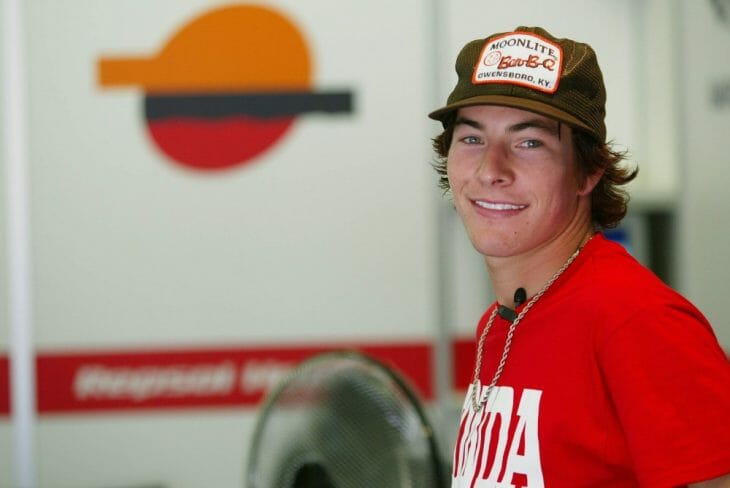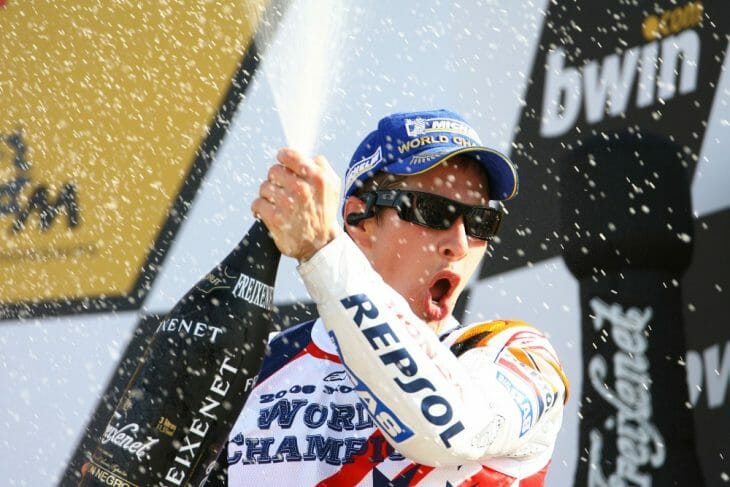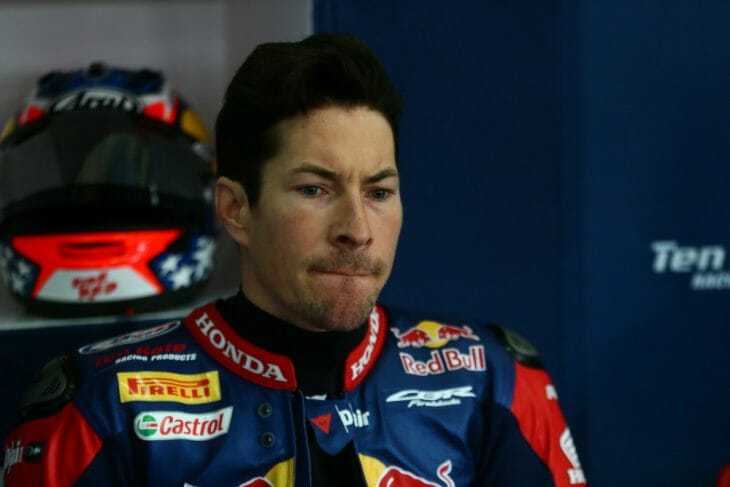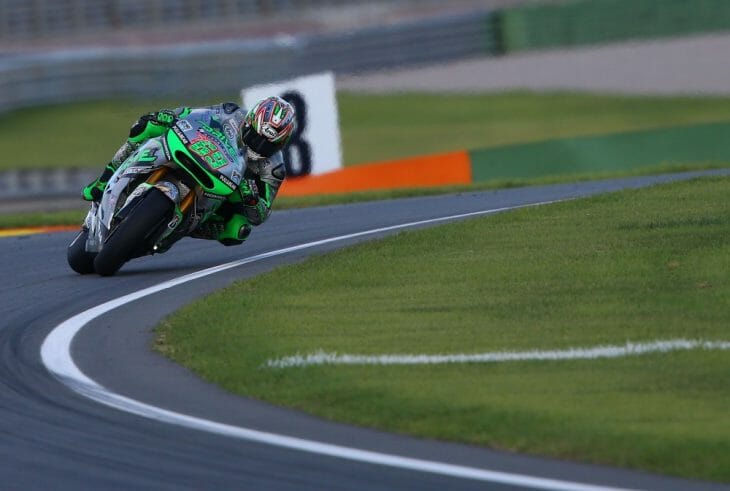Rennie Scaysbrook | May 25, 2017
“A man who, it seems, was not only admired by everybody who ever met him, but actually loved.”
 Bright eyed and bushy tailed. A young Nicky Hayden in his MotoGP rookie year of 2003.
Bright eyed and bushy tailed. A young Nicky Hayden in his MotoGP rookie year of 2003.
It’s about the best thing you can say about it: he probably didn’t feel any pain. Better still, if it turns out after the accident investigation is published, maybe he didn’t even know what hit him. It is the very least Nicky Hayden deserved.
What he didn’t deserve was to lose his life aged just 35 because of something so prosaic as getting knocked off his bicycle by a Peugeot hatchback on the public road near the Misano circuit at 2:00pm on Wednesday, May 17, 2017. A man who had challenged the gods and come out winning, even when it went wrong. A man who even beat Valentino Rossi to the world championship.
And a man who, it seems, was not only admired by everybody who ever met him, but actually loved. Very widely so.
Nicky was a rare creature in a world where rampant egos vie with blatant attention-deficit personalities, and where kindness and good manners are generally subservient to ambition and greed. His smile said it all.
News of the ultimately fatal accident brought forth an outpouring of tributes, support and affection, from every quarter—from Rossi himself, who said “He was my best friend in the paddock”, to fans worldwide who had never even met him.
I was lucky to have done so, frequently and regularly over his 13-year grand prix career. Several things stood out: his determination, his work ethic, and his racing talent. And one thing that made him almost unique—the fact that he wasn’t interested only in himself. Every question you asked him, he’d ask one back about you.
Nicky was the middle of five children—three boys and two girls—born to Earl and Rose Hayden, in Owensboro, Kentucky.
 The man of his day of days: 2006 MotoGP World Champion at Valencia, 2006.
The man of his day of days: 2006 MotoGP World Champion at Valencia, 2006.
Both had been dirt-track racers. Earl handed on his AMA racing number to Nicky—69, because (as Earl had it) “It looks the same whichever way up you are”.
According to Nicky, Earl’s stories were always better than his. “He’ll talk about racing Daytona with no gloves, with girls as his pit crew, one you liked and one you needed to borrow her trailer,” Nicky said. “And then they got liquored up and spilt gas on him at his pit stop. Real racing stories …”
All five of the kids would race motorcycles, including the girls. According to Nicky, it was the kids who wanted to do it, never the parents pushing. And it was sometimes a struggle. The family wasn’t well off. In between practicing and training, Nicky would put in time at Earl’s used-car lot, Second Chance Autos. “Some day’s we’d have to do a repo—that was always interesting.”
Nicky never did win a Grand National dirt-track mile—years later, he told me it was still a regret.
But he was a natural at road racing, and won the AMA Supersport title in 1999, then the premier Superbike title in 2002, including the Daytona 200.
His reward was a place alongside Rossi in the Repsol Honda factory team.
Nicky arrived as an innocent, a wide-eyed boy from down home Kentucky. I recall a story from his first GP in Japan. Sitting in business class, he was asked if he’d like to put his hand luggage in the overhead locker. He grabbed it all the tighter. “No! It’s got my passport in it,” he said.
He was in at the deep end, but not out of his depth, finishing fifth overall with two third places, one at Motegi, just a couple of seconds behind Rossi. As importantly, he scored points at every round but two. Consistency would become a keynote.
His first win was a home-race milestone, in 2005 at Laguna Seca. That year he was third overall.
The best was to come. Only two more wins in 2006 (one in the USA again), and then a real sting in the tail—a final showdown with Rossi when it was the Italian legend who blinked first, and the Kentucky Kid who took the gravy.
It was, of course, a dream come true.
 Hayden at what would turn out to be his final motorcycle race, the recent Imola WorldSBK round.
Hayden at what would turn out to be his final motorcycle race, the recent Imola WorldSBK round.
“I had big dreams. I didn’t dream that I wanted to be the fastest rider in Kentucky, and not make enough money to eat.”
Nicky had two more years with Repsol Honda, then joined Ducati and shared in a steady decline for the Italian marque, joined by Rossi again for two years.
Finally, came two seasons on the downbeat production Honda before moving to World Superbikes with the semi-official Ten Kate Honda team. Another downbeat bike, but he took it to the top, winning in the wet at Sepang.
This, almost exactly a year before his fatal crash, made him only the second rider to win races in AMA Superbikes, MotoGP and Superbikes after Ben Spies.
Aside from his friendly nature, Nicky was unfailingly modest. He was significantly the most successful Hayden, though elder brother Tommy and the younger Roger Lee are both distinguished U.S. superbike riders.
“I will say I’ve had the most success on paper,” he told me. “But I wouldn’t necessarily say I’m the best. I’ve had some good opportunities and been in the right place at the right time, and took advantage of ‘em.
 Nicky Hayden certainly knew how to make a motorcycle dance.
Nicky Hayden certainly knew how to make a motorcycle dance.
“Tommy’s my biggest go-to guy as far as … I wouldn’t say rider coach, but when we was growing up my dad was off trying to pay for the bikes and my brother was the one teaching me how to ride them.”
Nicky’s trademark, aside from consistent finishing, was a work ethic that meant he was always the first one out at tests, and the last to finish. In this way he taught himself how to ride in the wet, and worked tirelessly on development.
“I like the work,” he said. “I like to be a grinder, to put in the process, and when it all comes together seeing it pay off.”
He was working when he was knocked off his bike—training to get fit. He suffered catastrophic head injuries, as well as other fractures. Put on life support, his family and doctors agreed to throw the switch five days later.
Nicky’s death left his team and the rest of racing—all of us—bereft.
Most of all, he left his family bereft—Earl and Rose, brothers Tommy and Roger Lee, and sisters Jenny and Kathleen, and his fiancée Jackie Marin. Their loss is incalculable.
But I bet they’re proud of him.